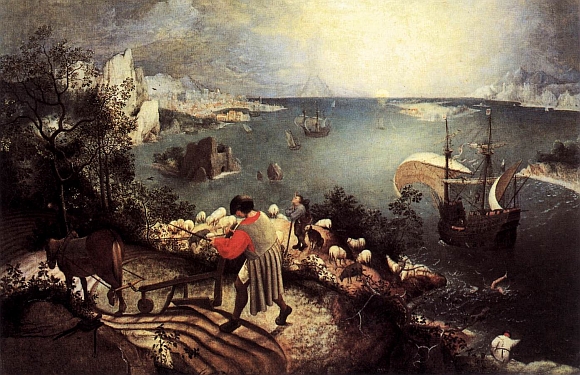
O Mittag, der mit heißem Heu mein Hirn
zu Wiese, flachem Land und Hirten schwächt,
daß ich hinrinne und, den Arm im Bach,
den Mohn an meine Schläfe ziehe —
o du Weithingewölbter, enthirne doch
stillflügelnd über Fluch und Gram
des Werdens und Geschehns
mein Auge.
Noch durch Geröll der Halde, noch durch Land-aas,
verstaubendes, durch bettelhaft Gezack
der Felsen – überall
das tiefe Mutterblut, die strömende
entstirnte
matte
Getragenheit.
Das Tier lebt Tag um Tag
und hat an seinem Euter kein Erinnern
der Hang schweigt seine Blume in das Licht und wird zerstört.
Nur ich, mit Wächter zwischen Blut und Pranke,
ein hirnzerfressenes Aas, mit Flüchen
im Nichts zergellend, bespien mit Worten,
veräfft vom Licht —
o du Weithingewölbter,
träuf meinen Augen eine Stunde
des guten frühen Voraugenlichts –-
schmilz hin den Trug der Farben, schwinge
die kotbedrängten Höhlen in das Rauschen
gebäumter Sonnen, Sturz der Sonnen-sonnen,
o aller Sonnen ewiges Gefälle —
O noontime, whose warm hay lowers my brain
to the field, the flatlands, and pastoral settings,
so that I run down, my arm in the creek,
Drawing the poppy to my forehead —
great overarching one, dislocate my eye,
still flying above the curses and the grief
of becoming and being.
Still through mountain pebbles, through carrion of the countryside,
through dusty, begging serrations
of the rocks — everywhere the
Deep maternal blood, the streaming
defiant
dull
sustenance.
An animal lives day by day
Its udder possessed of no memory,
The hillside silently exposes its bloom to the light
and is destroyed.
Only I, with a watchman between blood and claw,
Carrion with a picked-brain, with curses
Flung into the void, spat upon with words,
Aped by light —
o great overarching one
Drop one hour into my eyes
The beautiful early light that no eyes saw —
dissolve the deceit of colors, sway
the shit-encrusted caves in the noise
of the sylvan suns, in the fall of the suns of suns,
O eternal fall of all suns.
—Gottfried Benn, Ikarus (first part)(1915) in Gesammelte Werke, vol. 1, pp. 46-47 (D. Wellershoff ed. 1968)(S.H. transl.)
Gottfried Benn’s Ikarus is unmistakably a description of the Brueghel painting, “Landscape with the Fall of Icarus,” which is patiently described in the poem. Note that the Brueghel painting is called a landscape with Icarus, which is to say, Icarus seems almost a secondary feature of the work; not a focus of attention. In fact you need a patient eye to find him. The text and the painting both follow Ovid’s Metamorphosis, where the story is recounted–at the fatal moment of Icarus’s fall there is the fisherman, the ploughman and the shepard. But Brueghel sends us a message with his transpositions. His focus is on the peasant in the fields, tilling, and the shepard taking a break in the midday heat, gazing to the sky, seeming lost in thought. Icarus is coincidental it seems.
There is something else inexplicably wrong with this painting, though. It’s the midday sun and its heat that are essential to the tale; they melt the wax that holds together the wings Daedalus fashioned for Icarus, causing the tragedy. But in the Brueghel painting, the sun is setting; it’s almost evening. This can’t be squared with the scene in any way. I have puzzled over this and can’t make sense of it. Perhaps it’s just because Brueghel likes the dramatic effect of the setting sun (the “Census at Bethlehem” being another wonderful example). He does use it wonderfully in this painting–there are three points of light reflecting through the painting: one the setting sun, one over the water, and the third surrounding the ploughman. The effect seems to link the worker to the sea and then to the horizon. Does he mean something deeper by this? Perhaps.
I suspect Gottfried Benn, who approaches these things with the trained diagnostic eye of a doctor does. Who is the person speaking in his poem? Is it, as I imagine, the shepard with curiously Breughel-like features gazing heavenwards? In any event, the inner theme here is dislocation (daß ich hinrinne, a Hoffmansthal formulation; entstirnt), an individual losing consciousness of his Self and flowing into the all. The perspective could be justified from modern psychoanalytic theory. But on the other hand it also seems to have elements of Spinoza’s pantheism, or of the classical perspective of the philosopher of flux and change, Heraclitus (“?? ????? ??? ??? ????? ?????,” goes a line attributed to him, “Everything flows, nothing stands still.” Man passes from living flesh and bones to corpse, to ashes, with the possibility of reemergence in another animate form. Benn’s reference to the arm in a creek can be seen as a cue to Heraclitus given his obsession with flowing water as a metaphor for this change, a metaphor that Benn adopts into “maternal blood.”) He gives us peasants chained to a brutish existence, but even as they seem unaware of it, part of a wondrous event, the miracle of the first human flight. That tragedy is thus the promise of improvement, of human progress, of humans using their brains and spirit to rise above a baser existence. So Benn reminds us of the burdens of the physical existence, of its troubles, but he speaks also of a wonder of the greater world around us, and of a challenge. He transforms the imagery of Brueghel into something quintessentially expressionist, and that, of course, suggests its universality. Benn’s poem is very modern in every respect, yet it well reflects the perspectives, images and ideas behind the Brueghel masterwork.



